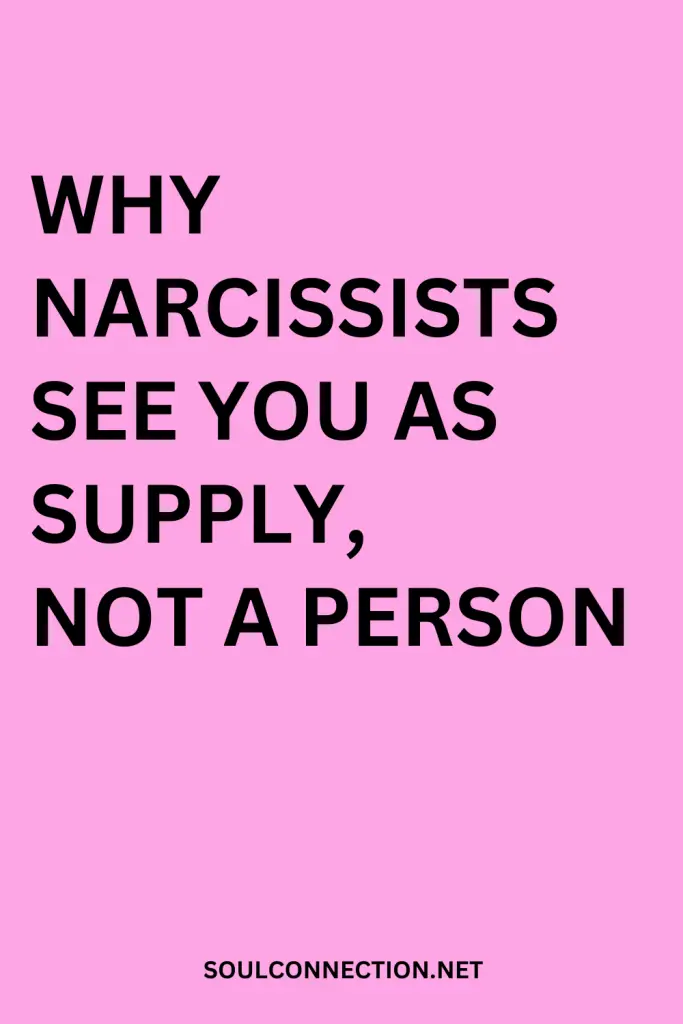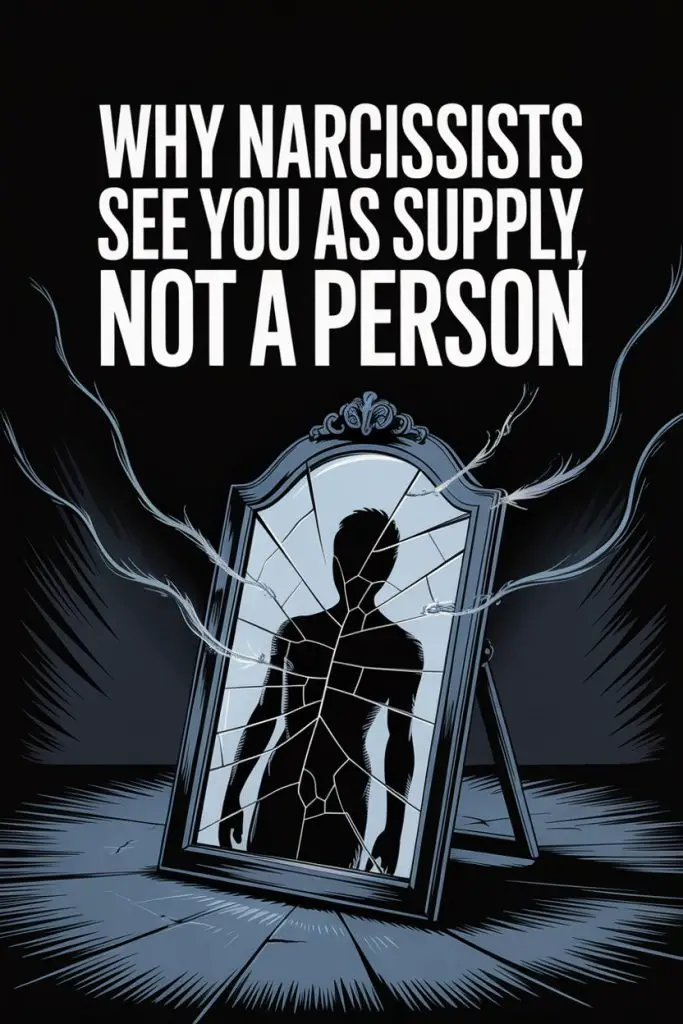You offer your best self. Love, support, laughter, the last slice of pizza.
Yet, around a narcissist, something always feels a bit… off. There’s an itch you can’t scratch, a sense you’re starring in someone else’s show.
If you’ve ever wondered why your needs seem invisible to the narcissist in your life, welcome to the concept of “supply”—where you’re less soulmate, more vending machine for their ego.
The Ego Buffet: What Narcissists Really Want
Narcissists are connoisseurs of validation. Imagine an endless buffet, but instead of food, the dishes are compliments, attention, status boosts, and adoration—all for their consumption.
This isn’t about hunger for intimacy or genuine companionship. The focus is on extracting emotional goodies, not sharing the meal. You’re not sitting across the table. You are the table.
When you’re with a narcissist, your feelings, desires, and dreams don’t register as separate or meaningful. The narcissist’s world is like a funhouse mirror: everyone’s just a reflection designed to make them look (and feel) bigger.
People as Accessories
Ever felt like an extension of someone else’s Instagram feed? That’s the narcissist’s approach to relationships. Partners, friends, even family—everyone is an accessory, a prop for the grand performance.
If you compliment their charm, you’re a great prop. If you point out flaws, you’re a broken one—time to be replaced or ignored. It’s not personal. (Well, it is, but not in the way you deserve.)
You might notice your achievements morph into theirs during storytelling. Your ideas? Adopted as their own. Your hardships? Fuel for their narrative of martyrdom.
That’s not empathy. That’s harvesting content.
The Supply Chain Never Sleeps
Supply is a never-ending craving. A narcissist’s sense of self is built on shaky ground, so they require a steady flow of reassurance and admiration.
The moment the energy ebbs—say, you have a bad day and can’t focus on them—they start to unravel or look elsewhere.
This explains the emotional highs and lows: one day you’re the golden child, the next you’re ignored or punished. It isn’t about you, your worth, or your contributions. The spotlight simply moves to where the supply’s strongest.
Ever feel like you’re auditioning for your own relationship? That’s because supply is transactional, not mutual. If you can’t provide, someone else will.
Emotional Vampire Mode: Why Empathy Doesn’t Register
Most people in relationships attempt a little thing called empathy. With a narcissist, empathy is like trying to get a cat to fetch your slippers. They might look at you, possibly blink, but don’t expect meaningful results.
Narcissists aren’t wired for shared emotional experience. They view emotions as tools, not invitations for connection.
Your happiness? A source of pride—for them. Your sadness? Either a nuisance or a stage for their own woes.
Try expressing your needs, and you might find the conversation flipping faster than a pancake on Shrove Tuesday. Suddenly, it’s about them: their stress, their sacrifices, their misunderstood genius. You exist—just not as yourself.
Why Your Boundaries Are Kryptonite
Boundaries are a narcissist’s least favorite word. Set one, and you’ll notice instant discomfort, maybe even outrage. Why? Because supply depends on your availability, flexibility, and willingness to put their needs above your own.
Healthy boundaries remind a narcissist you’re a person with limits, not a limitless resource. What happens next? Expect guilt trips, silent treatments, or a charm offensive designed to get you back in line.
Standing your ground may lead to accusations of being selfish or uncaring. The irony is rich, but don’t expect a narcissist to see it. Their focus stays on protecting their supply at any cost.
The Love-Bombing and Devaluation Rollercoaster
Remember those early days, when you were the most brilliant, attractive, fascinating person alive? That’s love-bombing—showering you with attention and affection to hook you as prime supply.
This phase ends sharply when reality creeps in (as it tends to). Suddenly, you can’t do anything right. Maybe you’re blamed for being “too sensitive” or “not appreciative enough.”
This whiplash isn’t about your actual value; it’s their way of keeping you off-balance. The hope is you’ll work even harder to get back in their good graces, which means ramping up the supply.
Why Change Feels Impossible
You might wonder, “If I love them enough, show enough patience, or go to enough couples’ therapy, will they finally see me?”
It’s the romantic’s eternal question. But narcissists are motivated by what you provide, not who you are. Your feelings are valid, but their sense of self is too fragile for true intimacy.
Awareness is the first step. If you’re stuck on the hope that loving someone out of narcissism is possible, pause. No one can heal another’s wounds without their full participation—and narcissists rarely see anything as their problem.
Practical Ways to Reclaim Your Personhood
Ready to be seen as a person again, not just supply? Even tiny shifts help. Start tonight.
- Set a small boundary. Maybe it’s protecting ten minutes alone in the evening.
- Share a feeling without apologizing for it. If the narcissist tries to redirect, gently repeat your message.
- Keep a journal. Seeing your reality in black and white helps counter the gaslighting.
- Build your support network. Friends, family, or even a support group—a reminder you’re more than a mirror.
- Give yourself permission to prioritize your needs. Self-care isn’t selfish; it’s survival.
The moment you honor yourself is the moment you chip away at the old supply chain.
When It’s Time to Walk Away
Some relationships can be improved. Others are best left behind.
If every attempt to assert your needs gets twisted, dismissed, or punished, you’re not in a partnership—you’re in a transaction. No amount of patience will turn a vending machine into a loving companion.
Leaving isn’t easy, especially if you’ve been conditioned to believe their version of reality. Gather evidence of your experience (journals, texts, emails) for your own clarity. Reach out for help, whether from trusted friends or professionals.
Walking away is not failure. It’s a profound act of self-respect.
Seeing Yourself Again
Being seen as supply is exhausting—and incredibly lonely. Yet, recognizing this dynamic is the first spark of freedom.
You are not a prop. You are not a trophy. You are not an endless resource for someone else’s ego project.
You are gloriously, stubbornly, heartbreakingly human. There’s a whole world out there (and within you) that honors that.
Leave the supply chain behind. You deserve relationships where being yourself is more than enough.


